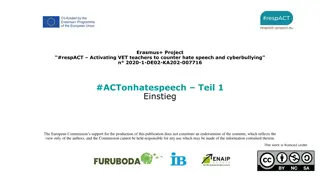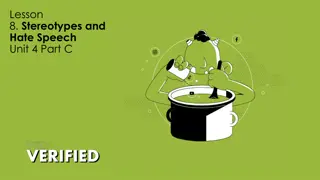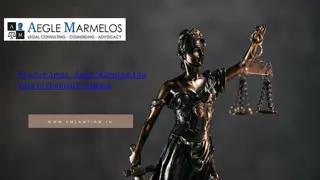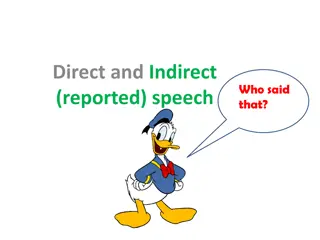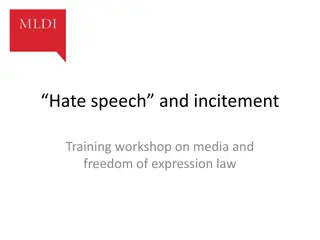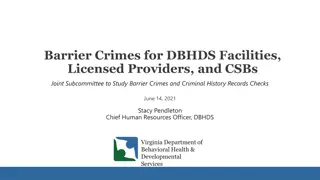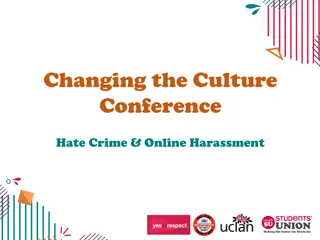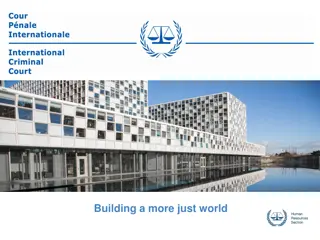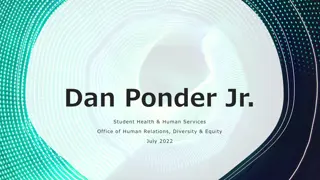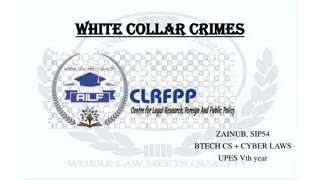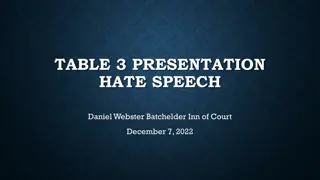Prevention and Combating of Hate Crimes and Hate Speech Bill [B.9B.2018]
The Prevention and Combating of Hate Crimes and Hate Speech Bill aims to address incidents motivated by prejudices through the creation of offenses of hate crimes and hate speech. It seeks to prevent and combat these offenses by defining hate crimes, hate speech, and establishing measures for prosecution and adjudication. The Bill outlines definitions, excludes certain courts from application, and sets out provisions related to hate crimes and hate speech.
Download Presentation

Please find below an Image/Link to download the presentation.
The content on the website is provided AS IS for your information and personal use only. It may not be sold, licensed, or shared on other websites without obtaining consent from the author.If you encounter any issues during the download, it is possible that the publisher has removed the file from their server.
You are allowed to download the files provided on this website for personal or commercial use, subject to the condition that they are used lawfully. All files are the property of their respective owners.
The content on the website is provided AS IS for your information and personal use only. It may not be sold, licensed, or shared on other websites without obtaining consent from the author.
E N D
Presentation Transcript
PREVENTION AND COMBATING OF HATE CRIMES AND HATE SPEECH BILL [B 9B 2018] SELECT COMMITTEE ON SECURITY AND JUSTICE 19 APRIL 2023
Background information 1. Bill 9 of 2018 1.1 Introduced on 13 April 2018. 1.2 Finalisation of Bill kept in abeyance pending CC judgment in Qwelane matter (to be discussed under cl 4). 1.3 Purpose of Bill: The Bill seeks to address the increasing number of incidents motivated by prejudices, in the form of hate crimes and hate speech, and to assist persons who are victims thereof; and The Bill creates the offences of hate crimes and hate speech and puts in place measures to prevent and combat these offences.
Bill: Content 2. Bill 9B of 2018 2.1 Cl 1 contains self-explanatory definitions. Court excludes district courts from the application of the Bill. Only the High Court and regional courts, where there are more experienced officers, may deal with the adjudication of these offences. Important definitions: characteristics (cl 3 hate crimes) and grounds (cl 4 hate speech); harm means substantial physical, social or economic detriment that objectively and severely undermines the human dignity of the targeted individual or groups; socialdetriment means detriment that undermines the social cohesion amongst the people of South Africa. emotional, psychological, 2.2 Cl 2 sets out the objects of the Bill, which are self explanatory.
Bill: Content 2.3 Clause 3: Hate crimes If a person commits any recognised offence under any law, referred to as the underlyingoffence , and the commission of that offence is motivated by prejudice or intolerance on the basis of one or more characteristics or perceived characteristics of the victim defined in clause 1 of the Bill, a family member of the victim or the victim s association with or support for a group of persons who share the said characteristics. Hate speech (cl 4) and the common law offence of crimen injuria are excluded from the ambit of cl 3. A prosecution in respect of a hate crime may only be instituted on the authorisation of the Director of Public Prosecutions having jurisdiction (cl 3(3)).
Bill: Content 2.4.1 Clause 4: Hate speech Cl 4(1)(a): Any person who intentionally publishes, propagates, makes available or advocates or communicates anything to one or more persons in a manner that could reasonably construed to demonstrate a clear intention to be harmful or to incite harm and to promote or propagate hatred based on albinism, ethnic or social origin, gender, HIV or AIDS status, nationality or migrant or refugee status or asylum seekers, race, religion, sex, sexual orientation, gender identity or expression or sex characteristics or skin colour is guilty of the offence of hate speech. Cl 4(1)(b): Any person who intentionally distributes or makes available an electronic communication which constitutes hate speech, which is accessible by any member of the public or directed at a specific person who can be considered to be a victim of hate speech, is guilty of an offence.
5. Bill: Content 2.4.2 Clause 4: Hate speech (continued) Cl 4(2)(a) to (c): Confirm the right of freedom of expression as enshrined in section 16(1) of the Constitution, which includes, freedom of the press and other media, freedom to receive or impart information or ideas, freedom of artistic creativity and academic freedom and freedom of scientific research. These provisions exclude from hate speech anything done in good faith in the course of engagement in any bona fide artistic creativity, performance or other form of expression, academic or scientific inquiry or fair and accurate reporting in the public interest or the publication of any information. Cl 4(2)(d): excludes from hate speech any bona fide interpretation and proselytising or espousing of any religious conviction, tenet, belief, teaching, doctrine or writings. Paragraphs (a) to (d) will not qualify for exemption from hate speech if it advocates hatred that constitutes incitement to cause harm based on any protected grounds.
Bill: Content 2.5.1 Qwelane judgment Facts of case: Mr Qwelane published an article in a Sunday newspaper on 20 July 2008 which was found to be offensive towards members of the LGBT+ community; Matter eventually came before the CC at the instance of the SAHRC which received complaints from, among others, members of the LGBT+ community; Essence of case before the CC: Sections 10 and 12 of PEPUDA, read with sections 9 and 16 of the Constitution; Balancing the rights of freedom of expression, equality and dignity.
Bill: Content 2.5.2 Qwelane judgment PEPUDA: Prohibition of hate speech: S 10(1): Subject to the proviso in section 12, no person may publish, propagate, advocate or communicate words based on one or more of the prohibited grounds, against any person, that could reasonably be construed to demonstrate a clear intention to (a) be hurtful; (b) be or to incite harm; (c) promote or harmful propagate hatred. S 12 deals with the prohibition of dissemination and publication of information that unfairly discriminates. The Proviso provides that bona fide engagement in artistic creativity, academic and scientific inquiry, fair and accurate reporting in the public interest or publication of any information, advertisement or notice in accordance with section 16 of the Constitution, is not precluded by this section.
Bill: Content 2.5.3 Qwelane judgment Questions before CC Does s10 entails a subjective or objective test? With reference to the phrase that could reasonably be construed to demonstrate a clear intention the Court found that it is plainly an objective standard that requires a reasonable person test. Whether s10(1)(a) to (c) should be read disjunctively or conjunctively? The CC found that on a disjunctive reading, s 10 would prohibit mere private communication which could reasonably be construed to demonstrate a clear intention to be hurtful the CC found that this would be an overly extensive and impermissible infringement of freedom of expression the provision should be read conjunctively.
Bill: Content 2.5.4 Qwelane judgment Questions before CC Is the provision ( hurtful ) impermissibly vague? Hurtful on a conjunctive reading of the provision is redundant and contributes to the lack of clarity of the provision. The term hurtful is vague and breaches the rule of law. Whether the provision leads to an unjustifiable limitation of section 16 of the Constitution? The limitation of hurtful speech goes beyond the justified limitation of hate speech and is therefore unconstitutional.
Bill: Content 2.6 Clause 5: Victim impact statement Sets out what a victim impact statement is, namely a sworn statement by the victim which reflects the physical, psychological, social, economic or any other consequences of a hate crime or hate speech on a victim. The contents of the victim impact statement will be admissible as evidence in court, unless good cause to the contrary is shown.
Bill: Content 2.7.1 Clause 6: Sentencing Cl 6(1) provides that a person who is convicted of a hate crime is subject to the penalties set out in section 276 or 297 of the Criminal Procedure Act, 1977, subject to the penal jurisdiction of that court, (whether it be the High Court or the regional court); and alternatives to fines and imprisonment: Presiding officers can, in terms of existing legislation, among others, section 297 of the Criminal Procedure Act, 1977, impose creative sentences which keep convicted persons out of prison, for instance suspended sentences and the postponement of sentences, with appropriate conditions. Cl 6(2) provides that a court that imposes the sentence must, if section 51 of Act 105 of 1997, is not applicable; and in the case of damage to, the loss of, or the destruction of, property or the loss of money; physical, or other injury; or loss of income or support, suffered by the victim as an aggravating circumstance.
Bill: Content 2.7.2 Clause 6: Sentencing (Continued) Cl 6(3) provides that any person who is convicted of hate speech is liable to a fine or to imprisonment for a period not exceeding eight years, or to both a fine and such imprisonment.
Bill: Content 2.8 Clauses 7 and 8: National instructions and directives and Reporting Cl 7: the National Commissioner of SAPS and the NDPP, after consultation with DG: JCD and the National Commissioner of SAPS and the NDPP, to issue directives on relevant matters and these directives must be complied with by police officers and prosecutors in the execution of their functions under the Bill. Cl 8: requires the Minister, after consultation with the Minister responsible for SAPS and the NDPP, to make regulations on the information to be collected and collated by the SAPS and the NPA, respectively. The information obtained must be made available to Parliament and to the Chairpersons of the South Commission, the Commission for Gender Equality and the Commission for the Promotion and Protection of the Rights of Cultural, Religious and Linguistic Communities. African Human Rights
Bill: Content 2.9 Clauses 9 and 10: Prevention of hate crimes and hate speech and regulations Cl 9: deals with the prevention of hate crimes and hate speech and requires the State to promote awareness of the prohibition against these offences, aimed at the prevention and combating thereof. Training programmes, including social context training programmes, must be developed by the State and the South African Judicial Education Institute on the prohibition, prevention and combating of hate crimes and hate speech. Cl 10: empowers the Minister to make certain regulations in order to achieve the objects of the Bill.
Bill: Content 2.10 Clause 11: read with the Schedule to the Bill Sets out the consequential amendments of other Acts of Parliament, required by the Bill, namely amendments to the Criminal Procedure Act,1977, the Criminal Law Amendment Act, 1997 (dealing with compulsory minimum sentences), and the Child Justice Act, 2008. The amendments in the Schedule to the Bill only relate to hate crimes and not to hate speech. The hate crimes to be included in Schedules 5 and 6 to the Criminal Procedure Act, relating to bail, in Parts I and II to the Criminal Law Amendment Act, 1997, relating to compulsory minimum sentences and in Schedule 3 to the Child Justice Act, 2008, relating to the most serious offences committed by children, constitute the most serious offences. They are all characterised by the most violent infringements of the right to the security of the person or serious damage to property.
End of presentation Thank you
![Prevention and Combating of Hate Crimes and Hate Speech Bill [B.9B.2018]](https://cdn1.slideorbit.com/60513/prevention-and-combating-of-hate-crimes-and-hate-n.jpg)

